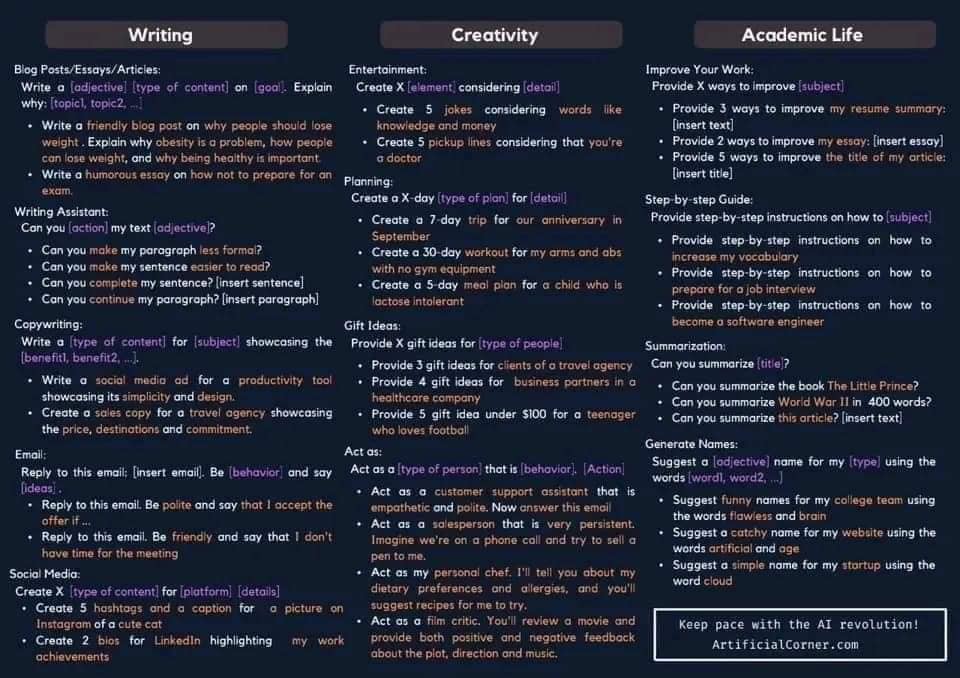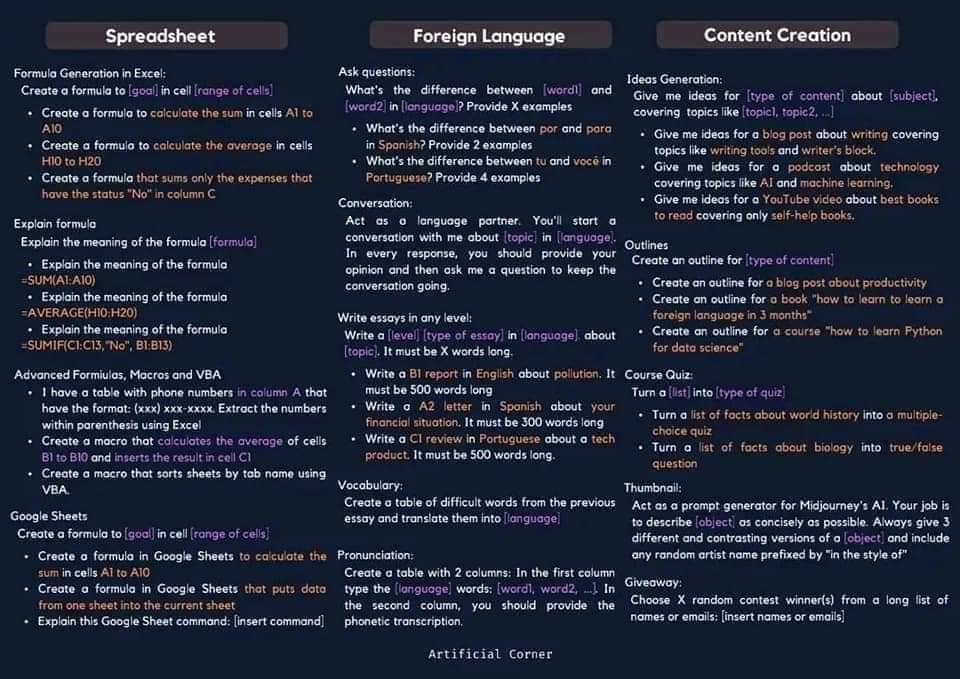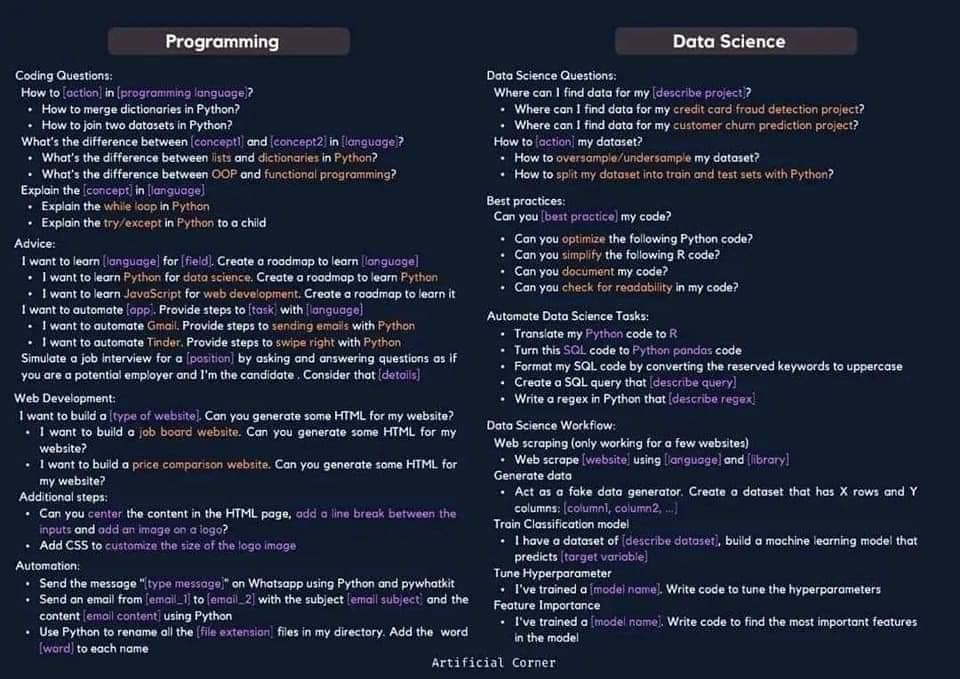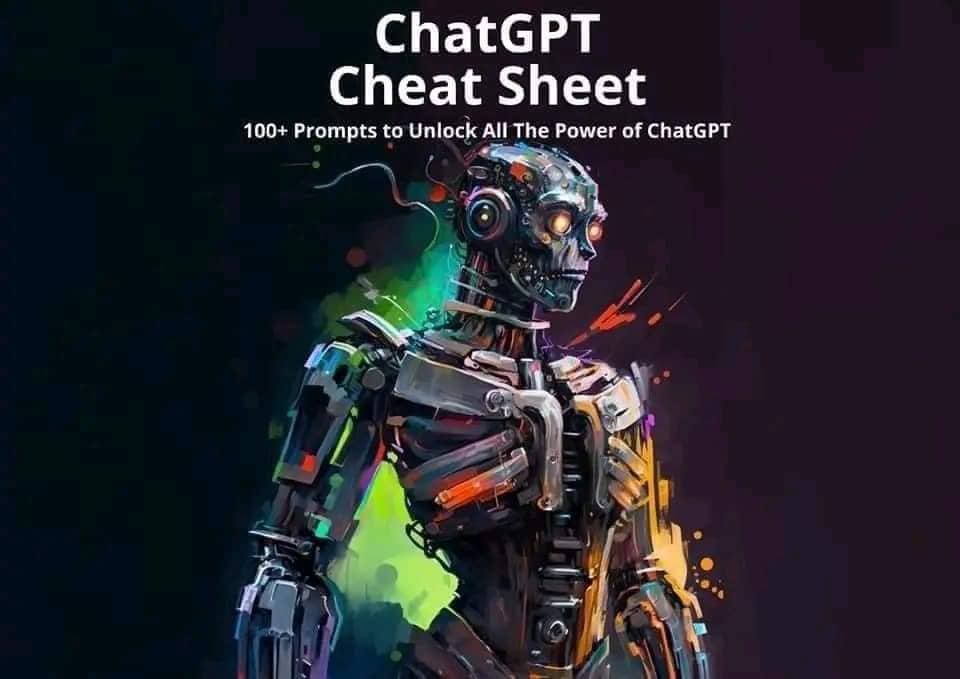ChatGPT Cheat Sheet: 100+ Prompts to Unlock All the power of ChatGPT
So, what exactly is a ChatGPT cheat sheet, and how can it be used? Essentially, a cheat sheet is a list of prompts or suggestions that can help guide users in generating text that meets their specific needs. For example, if you’re trying to write a persuasive essay on a particular topic, a ChatGPT cheat sheet might provide you with key arguments or talking points to include in your essay. Or, if you’re trying to write a business email, a cheat sheet might provide you with sample phrases or templates to use in your message.
Here is the chatGPT cheat sheet put together by Ricky Costa, an engineer at Neural Magic. Ricky has a history of putting together other great NLP projects, and has lived up to his previous outings this time around.
This cheat sheet illustrates the diverse abilities of OpenAI’s ChatGPT for developers and content creators to enhance their proficiency in large language model prompting across various domains including media content creation, natural language processing, and programming.
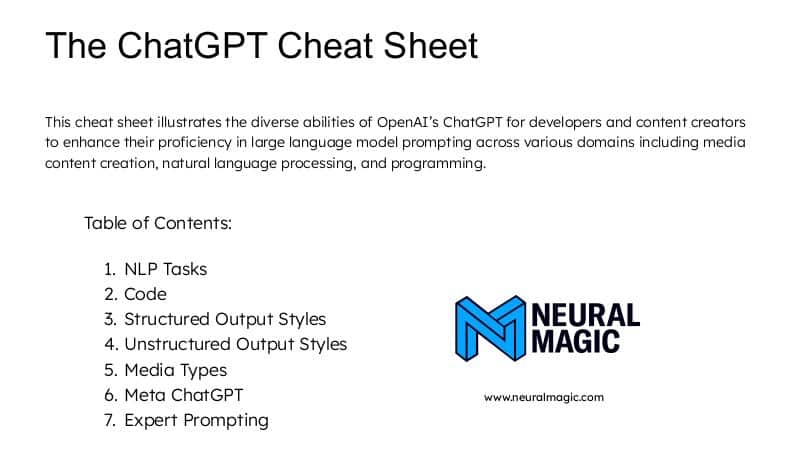
With this resource, you will learn:
- NLP Tasks
- Code
- Structured Output Styles
- Unstructured Output Styles
- Media Types
- Meta ChatGPT
- Expert Prompting
If you are interested in upping your prompt engineering game, get yourself a copy of this top notch resource right now.
As a language model, ChatGPT has been designed to assist users in generating natural language text in a variety of contexts. ChatGPT uses machine learning algorithms to analyze large amounts of data, and then uses this information to generate text that mimics human communication patterns.
One of the ways that ChatGPT can be particularly useful is by providing a “cheat sheet” of sorts for users who need help generating text in specific contexts. Whether you’re writing an essay, composing an email, or trying to come up with the perfect response to a friend’s text message, ChatGPT can help you find the right words to express yourself.
The beauty of a ChatGPT cheat sheet is that it can be customized to meet the needs of each individual user. Whether you’re a student, a professional, or just someone who wants to improve their writing skills, ChatGPT can help you find the right words to express yourself effectively.
Here are some examples of how a ChatGPT cheat sheet might be used in different contexts:
Academic writing: If you’re working on a research paper or essay, a ChatGPT cheat sheet might provide you with sample thesis statements, outlines, or topic sentences to help you structure your writing.
Creative writing: If you’re writing a novel, short story, or poem, a cheat sheet might provide you with prompts or writing exercises to help you generate new ideas or overcome writer’s block.
Business writing: If you’re writing a report, proposal, or email for work, a ChatGPT cheat sheet might provide you with sample phrases, templates, or formatting guidelines to help you communicate your message clearly and professionally.
Social media: If you’re trying to come up with the perfect caption for your Instagram post or the right response to a friend’s tweet, a ChatGPT cheat sheet might provide you with suggestions for hashtags, emojis, or clever turns of phrase to make your message stand out.
Overall, a ChatGPT cheat sheet can be an incredibly valuable tool for anyone who needs help generating natural language text in a variety of contexts. Whether you’re a beginner or an experienced writer, ChatGPT can help you find the right words to express yourself effectively and convincingly.
ChatGPT for Developers
As a language model, ChatGPT can be an incredibly useful tool for developers who are looking to integrate natural language processing capabilities into their applications. Whether you’re building a chatbot, a virtual assistant, or a search engine, ChatGPT can help you generate text responses that are both informative and engaging.
Here are some ways that ChatGPT can be used by developers:
Chatbot development: Chatbots are becoming increasingly popular in a variety of industries, from customer service to healthcare. With ChatGPT, developers can create chatbots that can understand and respond to user queries in natural language. ChatGPT can be used to generate responses to user questions, provide information about products or services, or even engage in small talk with users.
Virtual assistant development: Virtual assistants like Siri and Alexa are becoming a ubiquitous part of our daily lives. With ChatGPT, developers can create virtual assistants that can help users with a wide range of tasks, from scheduling appointments to playing music. ChatGPT can be used to generate responses to user queries, provide recommendations, and even carry out simple tasks.
Search engine development: Search engines rely on natural language processing to understand user queries and provide relevant results. With ChatGPT, developers can create search engines that can understand user queries in natural language, and provide more accurate and relevant results. ChatGPT can be used to generate snippets of text that can be displayed in search results, or even provide more detailed responses to user queries.
Content generation: Developers can use ChatGPT to generate content for a wide range of applications, from product descriptions to news articles. ChatGPT can be trained on specific domains, allowing developers to generate text that is tailored to their specific needs.
To use ChatGPT in your development projects, you can access its API or pre-trained models. ChatGPT is constantly evolving and improving, and new models are being trained all the time. Whether you’re a seasoned developer or just getting started, ChatGPT can be an incredibly valuable tool for building applications that can understand and respond to natural language input.
100+ prompts to Unlock All the power of ChatGPT
